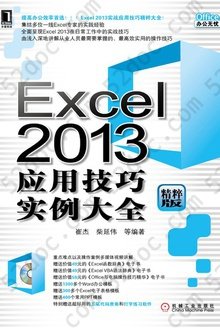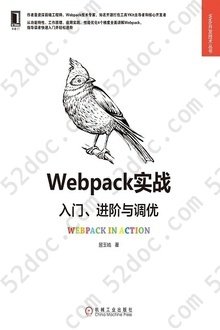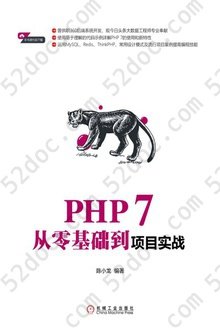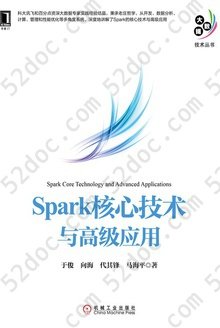注重体验与质量的电子书资源下载网站
分类于: 设计 云计算&大数据
简介

More Effective C++(中文版): 35个改善编程与设计的有效方法 豆 9.2分
资源最后更新于 2020-07-18 17:20:28
作者:梅耶(Scott Meyers)
译者:侯捷
出版社:电子工业出版社
出版日期:2011-01
ISBN:9787121125706
文件格式: pdf
标签: C++ 编程 C/C++ 计算机 程序设计 经典 侯捷 Meyers
简介· · · · · ·
《More Effective C++:35个改善编程与设计的有效方法(中文版)》是梅耶尔大师Effective三部曲之一。继Effective C++之后,Scott Meyers于1996推出这本《More Effective C++(35个改善编程与设计的有效方法)》“续集”。条款变得比较少,页数倒是多了一些,原因是这次选材比“一集”更高阶,尤其是第5章。Meyers将此章命名为技术(techniques),并明白告诉你,其中都是一些patterns,例如virtual constructors,smart pointers,reference counting,proxy classes,double dispatching……这一章的每个条款篇幅都达15-30 页之多,实在让人有“山重水复疑无路,柳暗花明又一村”之叹。 虽然出版年代稍嫌久远...
目录
译序(侯捷)
导读(introduction)
基础议题(basics)
条款1:仔细区别 pointers 和 references
distinguish between pointers and references.
条款2:最好使用 c++ 转型操作符
prefer c++-style casts.
条款3:绝对不要以多态(polymorphically)方式处理数组
never treat arrays polymorphically.
条款4:非必要不提供 default constructor
avoid gratuitous default constructors.
操作符(operators)
条款5:对定制的“类型转换函数”保持警觉
be wary of user-defined conversion functions.
条款6:区别 increment/decrement 操作符的
前置(prefix)和后置(postfix)形式
distinguish between prefix and postfix forms of increment
and decrement operators.
条款7:千万不要重载&&,和, 操作符
never overload &&, , or ,.
.条款8:了解各种不同意义的 new 和 delete
understand the different meanings of new and delete
异常(exceptions)
条款9:利用 destructors 避免泄漏资源
use destructors to prevent resource leaks.
条款10:在 constructors 内阻止资源泄漏(resource leak)
prevent resource leaks in constructors.
条款11:禁止异常(exceptions)流出 destructors 之外
prevent exceptions from leaving destructors.
条款12:了解“抛出一个 exception”与“传递一个参数”
或“调用一个虚函数”之间的差异
understand how throwing an exception differs from
passing a parameter or calling a virtual function.
条款13:以 by reference 方式捕捉 exceptions
catch exceptions by reference.
条款14:明智运用 exception specifications
use exception specifications judiciously.
条款15:了解异常处理(exception handling)的成本
understand the costs of exception handling.
效率(efficiency)
条款16:谨记 80-20 法则
remember the 80-20 rule.
条款17:考虑使用 lazy evaluation(缓式评估)
consider using lazy evaluation.
条款18:分期摊还预期的计算成本
amortize the cost of expected computations.
条款19:了解临时对象的来源
understand the origin of temporary objects.
条款20:协助完成“返回值优化(rvo)”
facilitate the return value optimization.
条款21:利用重载技术(overload)避免隐式类型转换(implict type conversions)
overload to avoid implicit type conversions.
条款22:考虑以操作符复合形式(op=)取代其独身形式(op)
consider using op= instead of stand-alone op.
条款23:考虑使用其他程序库
consider alternative libraries.
条款24:了解 virtual functions、multiple inheritance、virtual base classes、
runtime type identification 的成本
understand the costs of virtual functions, multiple inheritance,
virtual base classes, and rtti.
技术(techniques, idioms, patterns)
条款25:将 constructor 和 non-member functions 虚化
virtualizing constructors and non-member functions.
条款26:限制某个 class 所能产生的对象数量
limiting the number of objects of a class.
条款27:要求(或禁止)对象产生于 heap 之中
requiring or prohibiting heap-based objects.
条款28:smart pointers(智能指针)
条款29:reference counting(引用计数)
条款30:proxy classes(替身类、代理类)
条款31:让函数根据一个以上的对象类型来决定如何虚化
making functions virtual with respect to more than one object.
杂项讨论(miscellany)
条款32:在未来时态下发展程序
program in the future tense.
条款33:将非尾端类(non-leaf classes)设计为
抽象类(abstract classes)
make non-leaf classes abstract.
条款34:如何在同一个程序中结合 c++ 和 c
understand how to combine c++ and c in the same program.
条款35:让自己习惯于标准 c++ 语言
familiarize yourself with the language standard.
推荐读物
auto_ptr 实现代码
索引(一)(general index)
索引(二)(index of example classes,functions,and templtes)
导读(introduction)
基础议题(basics)
条款1:仔细区别 pointers 和 references
distinguish between pointers and references.
条款2:最好使用 c++ 转型操作符
prefer c++-style casts.
条款3:绝对不要以多态(polymorphically)方式处理数组
never treat arrays polymorphically.
条款4:非必要不提供 default constructor
avoid gratuitous default constructors.
操作符(operators)
条款5:对定制的“类型转换函数”保持警觉
be wary of user-defined conversion functions.
条款6:区别 increment/decrement 操作符的
前置(prefix)和后置(postfix)形式
distinguish between prefix and postfix forms of increment
and decrement operators.
条款7:千万不要重载&&,和, 操作符
never overload &&, , or ,.
.条款8:了解各种不同意义的 new 和 delete
understand the different meanings of new and delete
异常(exceptions)
条款9:利用 destructors 避免泄漏资源
use destructors to prevent resource leaks.
条款10:在 constructors 内阻止资源泄漏(resource leak)
prevent resource leaks in constructors.
条款11:禁止异常(exceptions)流出 destructors 之外
prevent exceptions from leaving destructors.
条款12:了解“抛出一个 exception”与“传递一个参数”
或“调用一个虚函数”之间的差异
understand how throwing an exception differs from
passing a parameter or calling a virtual function.
条款13:以 by reference 方式捕捉 exceptions
catch exceptions by reference.
条款14:明智运用 exception specifications
use exception specifications judiciously.
条款15:了解异常处理(exception handling)的成本
understand the costs of exception handling.
效率(efficiency)
条款16:谨记 80-20 法则
remember the 80-20 rule.
条款17:考虑使用 lazy evaluation(缓式评估)
consider using lazy evaluation.
条款18:分期摊还预期的计算成本
amortize the cost of expected computations.
条款19:了解临时对象的来源
understand the origin of temporary objects.
条款20:协助完成“返回值优化(rvo)”
facilitate the return value optimization.
条款21:利用重载技术(overload)避免隐式类型转换(implict type conversions)
overload to avoid implicit type conversions.
条款22:考虑以操作符复合形式(op=)取代其独身形式(op)
consider using op= instead of stand-alone op.
条款23:考虑使用其他程序库
consider alternative libraries.
条款24:了解 virtual functions、multiple inheritance、virtual base classes、
runtime type identification 的成本
understand the costs of virtual functions, multiple inheritance,
virtual base classes, and rtti.
技术(techniques, idioms, patterns)
条款25:将 constructor 和 non-member functions 虚化
virtualizing constructors and non-member functions.
条款26:限制某个 class 所能产生的对象数量
limiting the number of objects of a class.
条款27:要求(或禁止)对象产生于 heap 之中
requiring or prohibiting heap-based objects.
条款28:smart pointers(智能指针)
条款29:reference counting(引用计数)
条款30:proxy classes(替身类、代理类)
条款31:让函数根据一个以上的对象类型来决定如何虚化
making functions virtual with respect to more than one object.
杂项讨论(miscellany)
条款32:在未来时态下发展程序
program in the future tense.
条款33:将非尾端类(non-leaf classes)设计为
抽象类(abstract classes)
make non-leaf classes abstract.
条款34:如何在同一个程序中结合 c++ 和 c
understand how to combine c++ and c in the same program.
条款35:让自己习惯于标准 c++ 语言
familiarize yourself with the language standard.
推荐读物
auto_ptr 实现代码
索引(一)(general index)
索引(二)(index of example classes,functions,and templtes)







